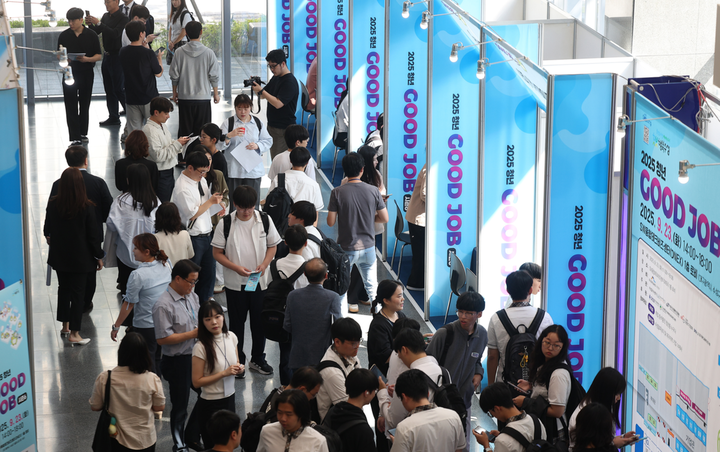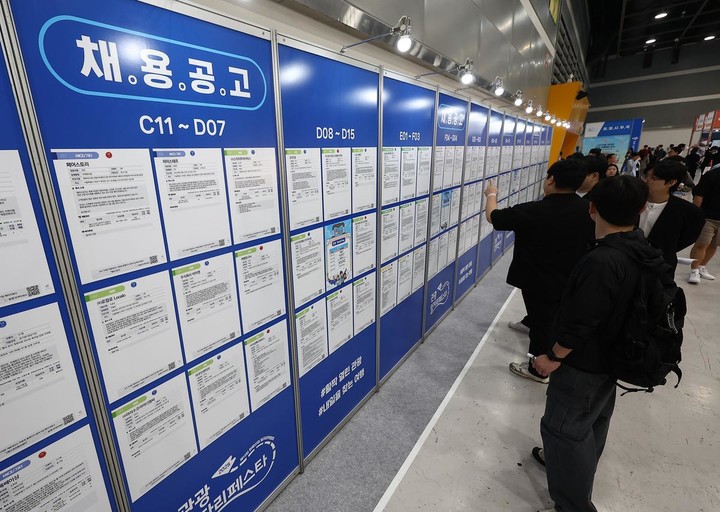For the first time since 1925, South Koreans in their 20s are now outnumbered by the population aged 70 and over
Declining youth population and weakening employment prospects raise concerns over Korea’s economic future

The pulse of South Korean society—its population in their 20s—is steadily fading.
According to the Population and Housing Census (Registered Census) results released by the National Statistical Office (formerly Statistics Korea) on October 12, the number of South Koreans in their 20s stood at 6.302 million last year, a decrease of 193,000 from the previous year. Meanwhile, the population aged 70 and over reached 6.543 million, surpassing those in their 20s for the first time since population records began. This demographic shift has not occurred since 1925.
The population of people in their 20s peaked at 7.03 million in 2020, but has now fallen for four consecutive years. Despite variable factors such as foreign inflows, the cohort has declined by 140,000 to 210,000 annually, making those in their 20s now the smallest group among South Korean adults—a so-called ‘minor generation.’
In contrast, last year the largest age group was those in their 50s (8.713 million), followed by those in their 40s (7.809 million) and 60s (7.791 million).

These demographic changes are also weakening employment indicators. As of August, the employment rate for people in their 20s was 60.5%, down 1.2 percentage points from a year earlier. Since August last year (61.7%), the employment rate for this demographic has either declined or stagnated for 12 consecutive months, showing no clear sign of recovery. The unemployment rate for people in their 20s in the same month rose 1.0 percentage points to 5.0%—the highest in three years, since 2022.
Changes in recruitment practices are also disadvantaging young job seekers. Amid a trend of reduced open recruitment and increased experienced and sporadic hiring by large companies, a survey by the Korea Economic Research Institute showed that 28.1% of so-called “new hires” with university degrees at Korea’s top 500 firms last year were, in reality, experienced workers. This marks an increase of 2.3 percentage points from the previous year (25.8%), suggesting that the line between new and experienced hires is blurring.
Other factors exacerbating the youth job crisis include a sluggish manufacturing sector due to US tariff policies and a downturn in the construction industry. Experts warn that the rising barriers to societal entry faced by those in their 20s are discouraging marriage and childbirth, which could erode the momentum of the Korean economy in the long run.
Kwak Seok Kim, head of the Economic Research Division at the Korea Institute of Economic Industry, commented, “The decline in the population of people in their 20s and worsening job prospects is not merely a generational issue—it signals fundamental challenges to national competitiveness,” adding, “This could reinforce a vicious cycle that worsens both low birthrates and population aging.”
Note “This article was translated from the original Korean version using AI assistance, and subsequently edited by a native-speaking journalist.”
Photo=Yonhap News
추천 뉴스
- 1 Jung So-min Stuns in All-Black Dress at "My Universe Marry Me" Press Conference Actress Jung So-min drew attention for her adorable beauty, shining through even in an all-black ensemble.On the afternoon of October 10, Jung So-min attended the press conference for the upcoming SBS drama “My Universe Marry Me,” held at the SBS Mokdong studios in Yangcheon-gu, Seoul.She was joined
- 2 Why $51 Million in Fines Against Google and Apple Remain on Hold for Two Years Choi Soo-jin, a member of the National Assembly's Science, ICT, Broadcasting, and Communications Committee, has pointed out that the sanction procedures for fines intended for Google and Apple have been stalled for nearly two years.The Broadcast Media Communications Commission—successor to the Korea
- 3 President Lee Jae-myung Highlights K-Food as the Core of Korean Culture on "Please Take Care of My Refrigerator" President Lee Jae-myung made a special appearance on the JTBC variety show "Please Take Care of My Refrigerator since 2014," expressing keen interest in the global potential of K-Food.The episode, airing on October 6, featured President Lee and First Lady Kim Hye-kyung as special guests. In the rele
- 4 Lim Young-woong Surpasses 12.5 Billion Streams During Chuseok Holiday Singer Lim Young-woong continues to set new records even during the Chuseok holiday, solidifying his status as one of Korea’s top music sensations.As of October 4, Lim Young-woong surpassed a cumulative 12.5 billion streams on Korea’s leading music platform Melon. The exact figure stood at 12,504,16
- 5 Hwang Yu-min Secures Direct Entry to the LPGA Tour with Four Consecutive Birdies Hwang Yu-min has realized her dream of joining the LPGA Tour, earning her tour card with an electrifying performance in Hawaii that saw her finish the Lotte Championship with a string of four consecutive birdies, bypassing the need for the grueling Q-Series qualifier.On October 5 (KST), at Hoakalei
- 6 Mother of Former MBC Weathercaster Ends 27-Day Hunger Strike After Reaching Agreement; MBC to Issue Official Apology Jang Yeon-mi, the mother of late former MBC weathercaster Oh Yo-anna, has ended her prolonged hunger strike after reaching a preliminary agreement with MBC, the broadcasting company. Civic groups Ending Credit and Workplace Gabjil 119 announced on the 5th that Jang had agreed to end her 27-day-long
- 7 BTS and Other Masked Singers Shine on King of Masked Singer, Drawing High Praise from Yoo Young-seok In the latest episode of MBC's "King of Masked Singer," which aired on the afternoon of the 5th, masked singers with impressive credentials—one of whom once stood alongside global superstars BTS—took center stage, captivating viewers and panelists alike.One masked performer left the audience and jud
- 8 Volleyball Legends Kim Yeon-koung and Coach Kim Ho-cheol Face Off in "Rookie Coach Kim Yeon-koung" Legendary volleyball player Kim Yeon-koung is set to go head-to-head with veteran coach Kim Ho-cheol.The highly anticipated second episode of MBC’s variety show “Rookie Coach Kim Yeon-koung,” airing on October 5, will capture the encounter between newcomer coach Kim Yeon-koung and the 30-year vetera
- 9 Cho Young-wook’s Equalizer Secures 1-1 Draw for FC Seoul Against Suwon FC, All but Assuring Final A Berth FC Seoul took a major step toward securing a spot in Final A after earning a crucial point in a hard-fought 1-1 draw against Suwon FC. The match, part of Round 32 of the Hana Bank K League 1 2025 season, took place on October 5 at Suwon Civic Stadium.Seoul’s tally now stands at 45 points, keeping th
- 10 British Magazine ELLE UK Issues Apology for Racial Discrimination Against BLACKPINK's Rosé British magazine ELLE UK has issued an apology after facing allegations of racial discrimination concerning BLACKPINK member Rosé.On October 3, ELLE UK posted an official apology on its social media, stating, "We sincerely apologize for cropping Rosé out of the group photo at Paris Fashion Week to f
